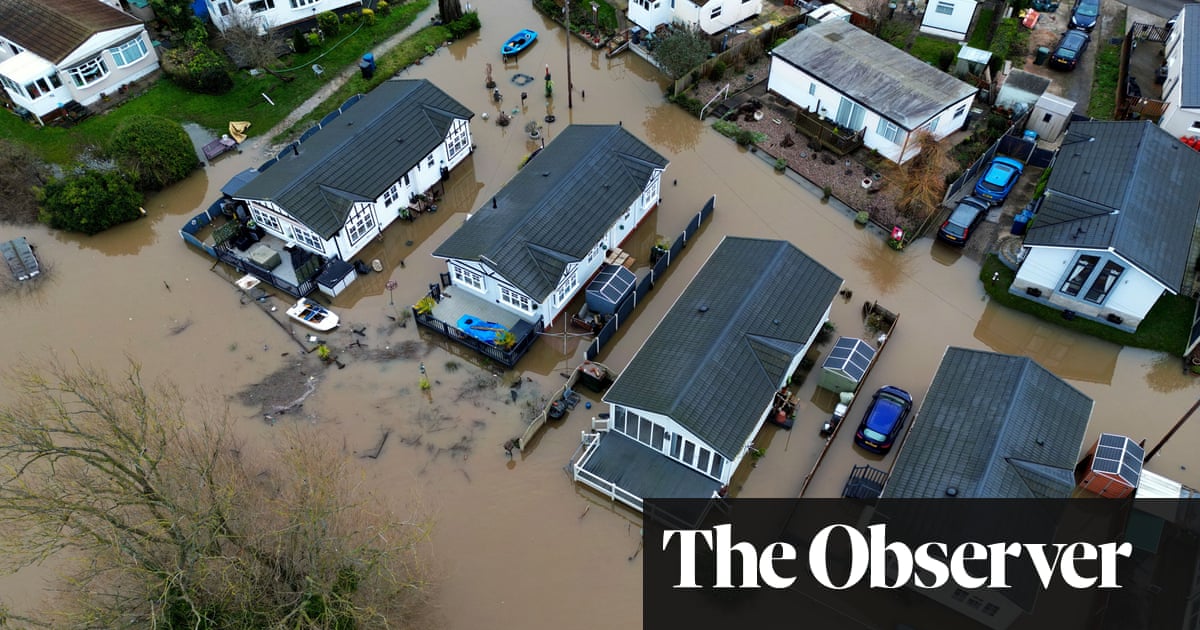
Ministers are being urged to overhaul the “nightmare” compensation scheme for flood victims after it emerged that nearly 80% of businesses in some parts of England had been denied support.
After heavy downpours caused chaos across much of England and Wales this week, new figures laid bare the “opaque” and inconsistent level of help available to those whose properties lay in ruin.
In Calderdale, West Yorkshire, where hundreds of homes have been battered by a series of storms in recent years, only 17% of businesses received government help in the wake of Storm Ciara in 2020.
The government’s Property Flood Resilience (PFR) scheme allows flood victims to apply for a grant of up to £5,000 to help repair the damage and make them more resilient to future storms.
However, campaigners have called for the Defra scheme to be overhauled due to the complex rules governing how the money is handed out, resulting in disparities across England.
Data obtained by Greenpeace’s Unearthed investigative unit found that on average, 72% of applicants to the PFR scheme in England were successful in 2020, the most recent year for which figures are available.
In Tunbridge Wells, all 42 of the homeowners and businesses who applied for the grant that year received a payout. But the success rate was far lower in other parts of England.
In Telford and Wrekin, where floods again caused havoc last week, barely half of those who applied in 2020 received support.
In Calderdale, which includes the flood-prone valleys of Hebden Bridge and Mytholmroyd, only 48% of the 519 homes and businesses who requested help in 2020 received any money. Of the 194 businesses, only 33 were successful.
Calderdale Council said one reason for the low acceptance rate was that many of the properties flooded in 2020 had already received a PFR grant in 2015.
Tracey Garrett, chief executive of the National Flood Forum, a charity that helps flood victims, said: “There are no rules or governance around how the grant is activated. It’s all very opaque. We need proper governance on it so it’s clear when it is activated and how to access it.”
Heather Shepherd, a flood consultant, described the PFR grants process as a “nightmare” and said there was a lack of support for flood victims generally.
Lynn Shortt, 63, said she received no help from the scheme after her home in Attleborough, Norfolk, was badly flooded in Christmas 2020. They were deluged again last year, when Storm Babet destroyed everything on the ground floor.
Shortt, who has multiple sclerosis, said she and her 73-year-old husband, Hans Shortt, had spent about £28,000 repairing the damage, taking money from a fund intended to pay her future nursing home bills, which, she said, had been “completely emptied”.
Shortt said they had been “strung along” since making their first PFR application in 2020 but were last month told they were being considered for help after last year’s flood.
“It’s just a complete mockery. It’s nonsensical,” she said. “I can absolutely categorically state this has got me down very badly. Your whole life has been whipped out from underneath you. The minute it starts to rain heavily, I can start to feel my heart racing. It’s horrific.”
Although the Shortts were advised to apply for the grant by Norfolk county council, the authority was not eligible for the 2019 and 2020 PFR schemes because it did not meet the eligibility criteria of 25 flooded properties, Defra said.
A spokesperson for Norfolk county council said it did not find out that it would be ineligible for the schemes until after households had lodged their applications.
A Defra spokesperson said: “Protecting communities from flooding is an absolute priority for this government, which is why we will launch a flood resilience taskforce to turbocharge the delivery of flood defences and natural flood management.
“The PFR grant helps make homes more resilient in case of future flooding events and grant funding is paid once the works are done, to ensure appropriate use of public money.
“Local authorities are responsible for assessing and approving individual applications for the PFR grant, which alongside the Flood Recovery Framework is only activated following severe weather events with wide area impacts. With localised flooding incidents, we would expect local authorities to have well-established contingency arrangements in place.”












